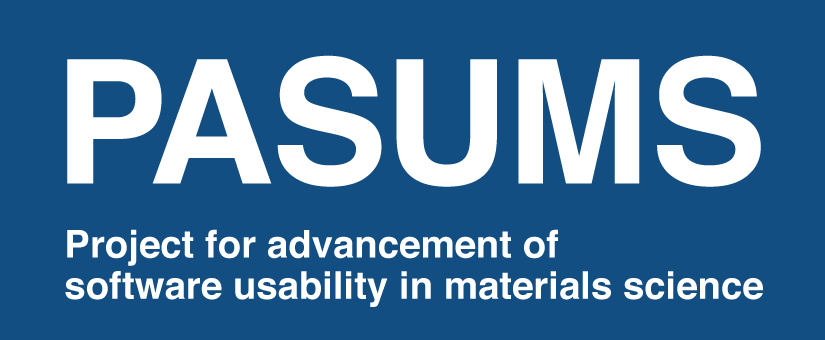PHYSBOについて
PHYSBOとは?
PHYSBO(optimization tool for PHYSics based on Bayesian Optimization)は、高速でスケーラブルなベイズ最適化 (Bayesian optimization) のためのPythonライブラリです。 COMBO(COMmon Baysian Optimization)をもとに、主に物性分野の研究者をターゲットに開発されました。 物理、化学、材料分野において、データ駆動的な実験計画アルゴリズムによって科学的発見を加速する、という試みが多く行われています。 ベイズ最適化は、このような科学的発見を加速するために有効なツールです。 ベイズ最適化は、複雑なシミュレーションや、実世界における実験タスクなど、目的関数値(特性値など)の評価に大きなコストがかかるような場合に利用できる手法です。つまり、「できるだけ少ない実験・シミュレーション回数でより良い目的関数値(材料特性など)を持つパラメータ(材料の組成、構造、プロセスやシミュレーションパラメータなど)を見つけ出す」ことが、ベイズ最適化によって解かれる問題です。ベイズ最適化では、探索するパラメータの候補をあらかじめリストアップし、候補の中から目的関数値が最大と考えられる候補を機械学習(ガウス過程回帰を利用)による予測をうまく利用することで選定します。その候補に対して実験・シミュレーションを行い目的関数値を評価します。機械学習による選定・実験シミュレーションによる評価を繰り返すことにより、少ない回数での最適化が可能となります。 一方で、一般的にベイズ最適化は計算コストが高く、scikit-learn 等のスタンダードな実装では、多くのデータを扱うことが困難です。 PHYSBOでは以下の特徴により、高いスケーラビリティを実現しています。
- Thompson Sampling
- random feature map
- one-rank Cholesky update
- automatic hyperparameter tuning
技術的な詳細については、こちらの文献 を参照して下さい。
ライセンス
Mozilla Public License version 2 (PHYSBO v2)
GNU General Public License version 3 (PHYSBO v1)
Copyright (c) <2020-> The University of Tokyo. All rights reserved.
本ソフトウェアの一部はは2020年度 東京大学物性研究所 ソフトウェア高度化プロジェクトの支援を受け開発されています。
PHYSBOを引用する際には、以下の文献を引用してください、
Bibtexは以下の通りです。
@article{MOTOYAMA2022108405,
title = {Bayesian optimization package: PHYSBO},
journal = {Computer Physics Communications},
volume = {278},
pages = {108405},
year = {2022},
issn = {0010-4655},
doi = {https://doi.org/10.1016/j.cpc.2022.108405},
url = {https://www.sciencedirect.com/science/article/pii/S0010465522001242},
author = {Yuichi Motoyama and Ryo Tamura and Kazuyoshi Yoshimi and Kei Terayama and Tsuyoshi Ueno and Koji Tsuda},
keywords = {Bayesian optimization, Multi-objective optimization, Materials screening, Effective model estimation},
abstract = {PHYSBO (optimization tools for PHYSics based on Bayesian Optimization) is a Python library for fast and scalable Bayesian optimization. It has been developed mainly for application in the basic sciences such as physics and materials science. Bayesian optimization is used to select an appropriate input for experiments/simulations from candidate inputs listed in advance in order to obtain better output values with the help of machine learning prediction. PHYSBO can be used to find better solutions for both single and multi-objective optimization problems. At each cycle in the Bayesian optimization, a single proposal or multiple proposals can be obtained for the next experiments/simulations. These proposals can be obtained interactively for use in experiments. PHYSBO is available at https://github.com/issp-center-dev/PHYSBO.
Program summary
Program Title: PHYSBO CPC Library link to program files: https://doi.org/10.17632/22d72yb6k6.1 Developer's repository link: https://github.com/issp-center-dev/PHYSBO Licensing provisions: GNU General Public License version 3 Programming language: Python3 External routines/libraries: NumPy, SciPy, MPI for Python. Nature of problem: Bayesian optimization (BO) can be used to select inputs that will yield better outputs from a list of candidate inputs with the help of machine learning prediction through a Gaussian process. Although BO is a powerful tool, two of its components, training the Gaussian process regression and optimizing the acquisition function, are generally computationally expensive. Moreover, hyperparameter tuning is necessary for the former process. Solution method: PHYSBO is a Python library for performing fast and scalable Bayesian optimization. To avoid the computationally expensive training process, PHYSBO uses a random feature map, Thompson sampling, and a one-rank Cholesky update. In addition, PHYSBO performs hyperparameter tuning automatically by maximizing the Type II likelihood, and MPI parallelization is used to reduce the calculation time for optimizing the acquisition function.}
}
開発者
PHYSBO は以下のメンバーで開発しています。
- ver. 1.0
- 田村 亮 (物質・材料研究機構 国際ナノアーキテクトニクス研究拠点)
- 寺山 慧 (横浜市立大学大学院 生命医科学研究科)
- 植野 剛 (株式会社 Magne-Max Capital Management)
- 津田 宏治 (東京大学大学院 新領域創成科学研究科)
- 本山 裕一 (東京大学 物性研究所)
- 吉見 一慶 (東京大学 物性研究所)
- 川島 直輝 (東京大学 物性研究所)

